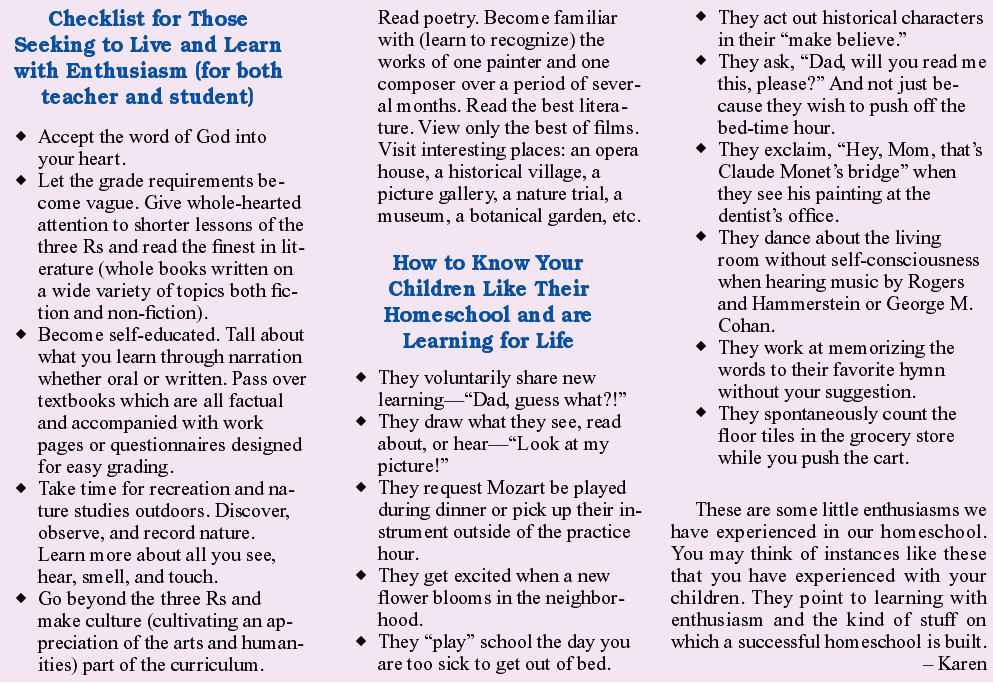 In the following article, I have borrowed passages from the article
“Enthusiasm” by Mrs. Boldero which appeared in Charlotte Mason’s
original magazine in the year 1897.
In the following article, I have borrowed passages from the article
“Enthusiasm” by Mrs. Boldero which appeared in Charlotte Mason’s
original magazine in the year 1897.
Charlotte Mason knew that for education to be successful it had to run
on the energy of the students as much, or more so, as that of the
teacher. She believed that enthusiasm for learning must be safeguarded
and that all true education is self-education. The self-educated,
self-made man is energetic, curious, and enthusiastic. Enthusiasm, more
than any other quality, has powerfully and permanently influenced the
shaping of mankind. Enthusiasm has swayed the hearts of nations and
determined the lives and characters of many individuals. Therefore,
parents should carefully consider enthusiasm in the scheme of education.
An Education of Lasting Value
Charlotte Mason considered the value of enthusiasm at the start of her
teaching career when she formulated her philosophy: knowledge for
knowledge’s sake. She was opposed to intellectual force-feeding and
found it entirely unnecessary in her method.
Grades were not a part of her program. She recognized that in many
schools statistics, prizes, and grades were more important than the
child’s genuine attainment of knowledge. Her students either understood
or they didn’t, but each was expected to do his very best.
In order to grade, one must have a grading system: a certain number of
completed questions to arrive at a grade percentage. To accommodate
these numbers, the curriculum becomes more factual—terminology
highlighted, memorization over-emphasized, and thinking left behind.
Today, when children become weary of this means to an end, teachers
remind them that “the grade is what’s important. You want a ‘good grade’
don’t you?” Charlotte Mason didn’t see the advantage of grades, but she
did see that a love of knowledge was the best motivation for learning.
Charlotte preserved enthusiasm for learning by providing lessons full of
delight. Disciplined subjects such as math and spelling were kept short
in the early years and consistently performed with strict attention.
Young students were read to out of a suitable “real” book. Charlotte
discovered that children enjoy the literary language of “real” books
more than a teacher’s lecture or a textbook. The children demonstrated
what they understood by relating the passage in their own words.
Charlotte’s technical term for this was “narration.” Her schoolchildren
narrated with observant detail and choice words, feasting on the whole
passage instead of responding with tidbit points. The anxious attitude
behind “do we have to know this for the test?” was never heard.
 Older students read and narrated on single questions that required them
to discuss any part of the curriculum: pollination, the Knights of the
Round Table, the functions of the inner ear, the voyage of the
Mayflower, or the life of Joseph in Egypt, for example.
Older students read and narrated on single questions that required them
to discuss any part of the curriculum: pollination, the Knights of the
Round Table, the functions of the inner ear, the voyage of the
Mayflower, or the life of Joseph in Egypt, for example.
Narration was the means for gaining knowledge from real (living) books
because, in Charlotte’s words, “What the child digs for becomes his own
possession.” With her method children become self-educated and gain
knowledge for knowledge’s sake. Continual grinding and cramming are cast
aside for an education of lasting value. (To read more about Charlotte’s
view of self education, see the first chapter of her book Philosophy of
Education. To read more about her view of grades and the tendency of
grind, see chapter 20 of her book Parents and Children.)
Culture Is Shared Enthusiasm
Charlotte Mason believed enthusiasm for learning produced enthusiasm for
life and culture. We should not considered culture a luxury or mere
trimming for the well-to-do. To Charlotte, culture was “a child’s very
bread of life.” In other words, a child cannot be spoiled by too much
culture.
Some human beings express themselves best through painting. Some write
poetry. Others put their heart into composing a symphony. Still others
raise the spirit of mankind through a story or play. Charlotte wished
all children, not just the well-to-do, to contact these human
expressions. If education is, in her words, “an atmosphere, a
discipline, a life,” the student will appreciate the arts and humanities
through his entire life. A successfully self-educated person learns how
to pick up the enthusiasm of great thinkers and doers—he is cultured.
Get Outdoors
Charlotte Mason encouraged first-hand experience with nature, the
outdoors, and the huff and puff of play. Recreation gives rest so we may
return to our work with ardor. As the poem says, “Students with
ardor/Work harder!” Habits of discovery, observation, and recording
provide the ground work for successful work in all the sciences.
Enthusiasm— God in us
The word “enthusiasm,” originally derived from the Greek word Entheos
(en–in, theos–god), literally means “full of God” or “inspired.” We can,
therefore, refer to an enthusiast as “one possessed by God.”
Charlotte’s philosophy mirrors that of John Calvin when he writes,
“Whenever, therefore, we meet with heathen writers, let us learn from
that light of truth which is admirably displayed in their works, that
the human mind, fallen as it is, and corrupted from its integrity, is
yet invested and adorned by God with excellent talents. If we believe
that the Spirit of God is the only fountain of truth, we shall neither
reject nor despise the truth itself, wherever it shall appear, unless we
wish to insult the Spirit of God.”
Though truly the “favorite virtue of heaven,” enthusiasm has sadly been
replaced with other reasons for living. Charlotte Mason wished children
to live by admiration, hope, and love. Thus, heroic stories from the
Bible and elsewhere were read to and by the children each term. She
wanted children to know the heroes and heroines, the poets, the prophets
and warriors, the high tempered spirits, the giants of human nature, who
through force of mind, courage and perseverance, have won the day for
nations and for individuals, when all other hearts but their own were
faint, and who against hope believed in hope when others desponded. She
thought children should strive for virtues not test scores and grades.
The enthusiast carries a glowing splendor and gladness which leads him
on to victory.
Results Of Enthusiasm
Let’s turn again to the arts, less heroic but no less marked in
intellectual pursuits and achievements. Only enthusiasm could have led
to the creations and results that are seen and heard in art. For
example, Beethoven, Handel, Schubert, and Bach, who we widely regard as
super-successful composers, not for their great financial successes
(none of them died rich) but for their enduring contribution to world
music, did not create their symphonies out of selfish ambition or desire
for fame. They all felt an absorbing, passionate love of their art.
Their enthusiasm gave full play to their emotions and led their inspired
souls to give utterance to imprisoned thoughts and to give to the world
a language without words. The beauty of their creations was in them, and
they desired that others should recognize it.
Michaelangelo, Raphael, Velasquez, and Rossetti, were born with a love
of form and color that led to the ideals of beauty. None could not have
survived the laborious years of disappointment, failure, poverty and
discouragement on the vainglorious love of fame. The will of these great
men was driven by desire, born of a pure and true enthusiasm that others
might see in their God-given art and love what they loved.
True Enthusiasm Presses Forward
True enthusiasm is far-seeing in hope and effort. Enthusiastic teachers
press forward through difficulty and discouragement, knowing that the
sovereign power of love will not fail in the end. For love—that greatest
thing in the world—can never fail.
Charlotte Mason encouraged enthusiasm in the young from the earliest
day. She wanted to let them learn that without the Entheos, the Spirit
of God in them, they would be nothing. She said, “Teach them how they
must put their whole being into action to arrive at the fullness of
their measure.” Now that is success!
